FATHER’S DAY
LECTIONARY COMMENTARY
Sunday, June 17, 2012
Lewis Logan, II, Guest Lectionary Commentator
Pastor, Ruach Christian Community Fellowship, Los Angeles, CA
Lection – Proverbs 3:11-12 (New Revised Standard)
(v. 11) My child, do not despise the Lord’s discipline or be weary of his reproof, (v. 12) for the Lord reproves the one he loves, as a father the son in whom he delights.
I. Description of the Liturgical Moment
Global in scope yet local in sentiment, the origins of the Father’s Day celebration has as many claimants as there are contextual origins and varied historical matrices. It encompasses the special informal celebration of fatherhood by individual children in posthumous observances to the more formal governmental fiat set to dates of a venerated national patriarch or that which is legislated or government-sanctioned, such as the third Sunday in June by the US Congress or the Second Sunday in August as in Brazil.
Father’s Day is the corollary to Mother’s Day. It is an opportunity to celebrate the unique contribution fathers make to the development and well-being of their progeny. From the perspective of our faith tradition we also remember that even if we do not have the benefit of a relationship with our biological father, we do have a Spiritual Father who created all of us. Our Spiritual Father/Creator intended for each of us to exist with a sense of purpose, dignity, and self-worth. Further, like a biological father, our Spiritual Father looks out for, provides for, protects, and corrects us.
II. Biblical Interpretation for Preaching and Worship: Proverbs 3:11-12
Part One: The Contemporary Contexts of the Interpreter
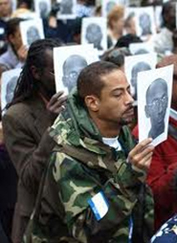
Protestors holding a picture of
Troy Davis
|
I am Troy Anthony Davis! No, really I am. This was more than the mantra of an international movement in resistance to the unjust state-sanctioned murder of this young man whose guilt was not proven beyond the shadow of any doubt. Part of his story is the story too often repeated ad-infinitum, adnauseum, regarding African American males. Troy Davis, like 75% of incarcerated African American males, grew up without a father in the home. According to consulted biographical sources, Troy’s father left the home when Troy was three years old.
Decreased wealth and family income pose problems for the same demographic because of the absence of the father’s income. I grew up with my father in the household with me. I believe that my father’s presence alone was the key factor in enabling me to avoid the pitfalls that so often create a feeder community for the global billion-dollar incarceration industry. This is not to say that Troy Davis’s family failed to properly rear him because of some economic dysfunction, but the statistical data related to this familial dynamic is significant.
|
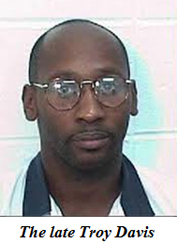 |
Further, there is one glaring contrasting reality that identifies the inherent contradiction in the facilities of incarceration as “Correctional.” Unlike the correction of a loving father who has a vested interest in his son or daughter’s well-being, the correctional system that disproportionately murders citizens of African descent takes life that it did not give and does so with egregious impunity and insatiability.
In the estimation of the unusually cogent and relevant Dick Gregory (who was interviewed at the occasion of Troy Davis’s October 1, 2011 funeral in Savannah, Georgia), Troy Davis’s murder means that “America can no longer point at China’s abysmal human rights record because the State of Georgia murdered a man whose innocence or guilt is still in question.” Further, I posit that given the historic record of the administration of the death penalty by the department of “IN-corrections,” if Troy Davis were wealthy and white he’d still be alive.
|
This form of correction is far removed from that which Solomon refers to in Proverbs 3:11-12. Hence, I deeply abhor and reject its claims to legitimacy or credibility. I am, you are, we are Troy Anthony Davis.
Part Two: Biblical Commentary
Solomon’s story often baffles me as it relates to ironies and contradictions in terms of his origins and ends. While his name means “peace” or “wholeness” reflective of the expression “Shalom,” significant moments in his life were anything but peaceful. He is fathered by a man of war, King David, who was also a man after God’s own heart (1 Samuel 15:13), but who violently took Solomon’s mother, Bathsheba, from her husband, Uriah, who was one of David’s officers (2 Samuel 12–13).
The prophet Nathan tells David that “the sword will never leave your household” (2 Samuel 12:10). While Solomon may have been somewhat sheltered from the instances of violence within his family, it can be surmised that he was aware of the tensions and dysfunction in his household (2 Samuel 13–18).
Solomon authors much of the collection of sage sayings, didactic iambic pentameters, and cryptic sayings called Proverbs, reflecting unparalleled wisdom divinely dispensed to him (1 Kings 3:12 ). Explicit and implicit are the two simultaneous sources of fatherly direction Solomon may have drawn from in the scripting of these compiled musings.
Ultimately, God is the one source. Accordingly, in Proverbs chapter 3 verse 11, Solomon suggests to his readers, “My child, do not despise or reject (maas) the Lord’s discipline.” The self-existent, self-reliant, self-sufficient God (the musar pronounced moo-sawr) reproves the one he loves (most commonly understood as corrects or disciplines). Solomon, understanding that how one ends matters, asks his readers to not be weary (takotz—which means to loathe or grow sick of) of the Lord’s reproof. Wise counsel, even today.
Solomon’s father, David, was also a primary source in his life. In David’s final exposé, he tells his son Solomon how to be a man by following after the commandments of the Lord (1 Kings 2:2-3). Despite his father’s instructions, Solomon’s end in 1 Kings 11 and 12 is in stark contrast to his beginning in 1 Kings 2. It is a cautionary tale useful for modern fathers.
The Solomon who is given instructions by his father King David (1 Kings 2), is in no position to give instructions to his successor and son Rehoboam (1 Kings 12).
Perhaps Israel would not have been split into a Northern and Southern Kingdom (1 Kings 13) had Solomon followed his own words in Proverb 3:11-12, or better yet those of both of his Fathers. Solomon’s life story is a commentary on what happens when the Lord’s chastisement is despised or abhorred. Although Solomon’s sagacious 40-year rule over Israel occasioned an era of unprecedented peace, prosperity, capital development, and cultic establishment with the erection of the Temple of God on Araunah’s threshing floor (2 Samuel 24:18-24; 2 Chronicles 3:1), Solomon rejected and abhorred God his Father’s correction (1 Kings 11:1-40). Solomon’s “do as I say and not as I do” attitude did not work and will never work for fathers. It didn’t work for David, Amnon, Absolom, Adonijah, Solomon, or Rehoboam.
Fathers are called upon to walk the walk and talk the talk. In other words, they must show consistent character. Teaching a child through discipline involves being a godly example as much as anything else. When fathers discipline their children, they are seeking to prepare them to be kingdom citizens and positive contributing citizens on earth. They are also teaching them that actions have consequences and that God will not tolerate ungodly behavior. All of this instruction is given from fathers to their children out of deeply felt love.
God’s love for God’s sons David and Solomon is evident through the chastisement God applied by diminishing their influence and allowing the internal opposition that occurred within their families and community. Yet God still allowed them to die with honor (1 Kings 11:14-43). Truly, God’s ways are past our understanding and the mercy of God endures forever.
Celebration
Like our biological or paternal father, God our Heavenly father intends and desires the best for us. God’s correction is to help, bless, and sustain us even if it means doing all of this and more to save us from ourselves. The prophet Jeremiah says it in a way that is encouraging and instructive: “I know the plans I have for you, to prosper you, to give you a hope and a future...!” Jeremiah’s exilic prophecy accentuates the dialectic of God the Father, correcting his child, the nation of Israel, through historic national humiliation and dislocation, yet doing so with beneficial future plans for their restoration and renewal. Our ultimate hope and cause for celebration is that even when they hurt, God’s admonitions help both as expressions of God’s love for us and as a way of preparing us for the best end.
Descriptive Details
The descriptive details of this passage include:
Sounds: The authoritative yet assuring voice of a father or father figure saying in essence, “I’m applying this discipline for your own good, because I LOVE YOU”; initial crying due to discipline and the sounds decreasing over time to a whimper and then silence;
Moods: Fatherly compassion and correction; the hurt, anger, embarrassment, and disappointment of being corrected by a father; the warmth of assurance and confidence in an unbroken relationship amidst admonition; and
Sights: A father’s grimace for having to apply corrective discipline upon his progeny; sobbing post chastisement of the child while in the embrace of the father; and fathers like the one described in Luke 15:11-24.
III. Other Material That Preachers and Others Can Use
Movies:
Courageous (2011)

Relevant theme or application: Balancing the demands and challenges of career and faith in God and Fatherhood.
Synopsis: Four men, one calling: To serve and protect. As law enforcement officers, Adam Mitchell, Nathan Hayes, David Thomson, and Shane Fuller are confident and focused. Yet at the end of the day, they face a challenge that none of them are truly prepared to tackle: fatherhood. While they consistently give their best on the job, good enough seems to be all they can muster as dads. They quickly discover that their standard for fathering is missing the mark. When tragedy hits home, these men are left wrestling with their hopes, their fears, their faith, and their fathering. Can a newfound urgency help these dads draw closer to God ... and to their children?
Liar, Liar (1997)

Relevant theme or application: Children suffer when fathers are not proper moral examples for their children. Children know right from wrong even when fathers may not. What we devalue we may lose.
Synopsis: Fletcher Reede (Jim Carrey) is a particularly career-focused lawyer and divorced father. He has a habit of giving too much attention to his job, breaking promises to his young son, Max, and then lying to both Max and his ex-wife, Audrey, about the real reason he missed the get-togethers. Fletcher lets Max down once too often, missing his birthday party, and has to deal with the consequences of a wish Max makes while blowing out the candles on his cake. Max wishes, “I wish that for just one day, Dad can’t tell a lie.” Immediately, that wish comes true.
Not Easily Broken (2009)
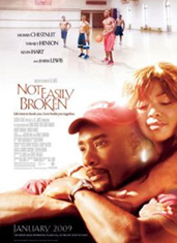
Relevant theme or application: Fatherhood is a gift to men who desire children. Fatherhood is giving what only a man can give as a role model to a boy. No career or other achievement can match the joys of fatherhood.
Synopsis: Dave and Clarice Johnson are in their second decade of marriage. Dave’s dreams of major league baseball success were dashed by an injury in college, leading him to a steady but unfulfilling career as the head of a small construction firm. Clarice is basking in the glow of real estate stardom, creating a life that revolves around her rise to the top. She has become blind to Dave’s needs, the most important being his desire to become a father and start a family with her.
Good Hair (2009)
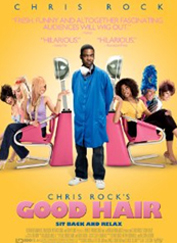
Relevant theme or application: A Black father has to correct the mis-education his children are receiving via media and the Internet. The role of a father is to provide children with goodly character and a sense of ethnic and personal self-worth.
Synopsis: Chris Rock, a man with two daughters, explores the term “good hair,” as defined by Black Americans, primarily Black women. He visits Bronner Brothers’ annual hair convention in Atlanta. He tells us about sodium hydroxide, a toxin used to relax hair. He looks at weaves, and he travels to India where ceremonies produce much of the hair sold in America. A weave is expensive: he asks who makes the money? He also visits salons and barbershops, central businesses in the Black community. Rock asks men if they can touch their mates’ hair. “NO, it’s decoration” is the response. Various talking heads (many of them women) comment throughout the film. Maya Angelou and Tracie Thomas provide perspective as well.
Real Steel (2011)

Relevant theme or application: It’s never too late to be a good father. Fatherhood requires a real heart of compassion, empathy, and selflessness. Fatherhood helps a man find and face himself. You can replace human boxers with robots but there are no replacements for real fathers.
Synopsis: In 2020, humans have been replaced by robots in boxing. Charlie Kenton (Hugh Jackman) is a former boxer who owns such a robot (Ambush) and he competes in unsanctioned matches and in exhibitions with it. At a rural fair, Ambush is destroyed by Black Thunder, a bull belonging to promoter Ricky (Kevin Durand). Having made a bet that Ambush would win, Charlie now owes Ricky $20,000, which he doesn’t pay before leaving the match. Charlie is informed that his ex-girlfriend has died and that he must attend a hearing to decide the fate of his preteen son, Max (Dakota Goyo).
Antwone Fisher (2002)
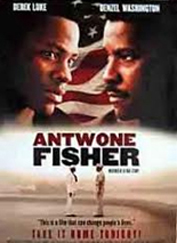
Relevant theme or application: The biggest need for a young man is a father. As a father figure, army officer and psychiatrist Jerome Davenport gives guidance and correction to help a young officer face his past and move on with his life.
Synopsis: This film marks the directorial debut of Denzel Washington. He also stars in the film as the psychiatrist Jerome Davenport, alongside Hollywood newcomer Derek Luke, who plays the title role (and personally knew the real Antwone Fisher). The film is inspired by a true story, with the real Antwone Fisher credited as the screenwriter, and is based on his autobiographical book Finding Fish. In the movie Antwone is in the Navy. He is a moody young man with a record of violence. After beating a white sailor who he believes made a bigoted remark towards him, Antwone is sentenced to be demoted, fined, and restricted to the ship for 45 days. His commanding officer also orders him to undergo psychiatric treatment. Antwone meets with psychiatrist Dr. Jerome Davenport (Denzel Washington). Davenport attempts to get him to open up, but Antwone is adamant he has no problems. When Davenport attempts to question him about his parents, Antwone claims that he does not have parents and that he came from “under a rock.” Antwone eventually gives in and explains his parenthood. His father’s name was Edward Elkins and he was killed when Antwone was 2 months old. Antwone’s mother, Eva Fisher, went to jail, and when she got out she did not claim Antwone, leaving him very bitter. Finding his family brings the healing Antwone had sought and echoes his dream of sitting at a feast surrounded by loving family members.
Boyz n the Hood (1991)
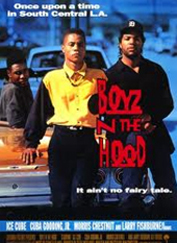
Relevant theme or application: The presence of a strong father makes a difference between life and death, especially in a crime-ridden, underserved community.
Synopsis: Tré (the son in the film) goes to live with his father (Furious). The father instructs him to rake the front lawn and assigns him other household responsibilities, which include cleaning and maintaining their home. Furious explains that, although these tasks may seem unfair and harsh, learning responsibility will make Tré a man and keep him from ending up dead or in jail. Furious, who appears to be the only father present in the neighborhood, fights to save his son and shows the power of the love of a good father, particularly in a rough black neighborhood.
|